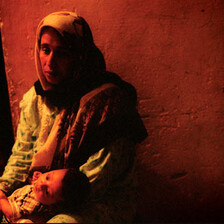Helicopter gunships fired into crowded areas of Nablus and Jenin again today. Nobody knows how many are dead. Yesterday’s count stopped at 44. Ariel Sharon hasn’t finished his ‘operation’ yet.
Hold your horses, George, Tony; I’m going as fast as I can. Just have to make sure we’ve smoked out (and then snuffed out) all the terrorists. Surely, George, you understand this? And if you don’t, tough. This is my land; these are my wild Indians. Mind your own terrorist wars.
Life has taken on a surreal quality in Gaza, where we sit in our offices more silently than usual. The news hasn’t improved and no one has anything to say. The waiting game continues. When will they come for us? Nobody knows, but the people here are pessimistic enough after five decades of experience to assume it won’t be long.
Sand-hill barricades have begun to appear around the crumbling camps and the towns. Children construct their own barricades from garbage, stacking it tightly in rough piles nearly as high as they are. If you close your eyes you can imagine for a second that they are effective tank deterrents. And the ragged, bleary-eyed men with guns slung over their shoulders at the street corners are the superior fighting forces poised to take on the Israel Defense Forces, the sixth most powerful military in the world, when they come rolling in to town.
What is routine has become absurd: An ice-cream truck drives around Gaza City day after day, hour after hour, with Beethoven’s “Fuer Elise” piping out of its loudspeaker as if from a tin whistle. I’ll never hear this tune again without feeling that I am caught in the eye of a storm. No one ever buys ice cream. We drift in an unquiet calm.
Next to the “Oasis” Internet café where we write and chat away our frustrations in the afternoons is a coffee shop called the “Titanic”. I refuse to take my coffee break there, preferring instead the one-shekel falafel dive down the street where news blares endlessly from a big TV in the corner of the kitchen –You are American? The proprietor asks me, and then points to the images of tanks rolling over West Bank cities. His face is grim; my face is grimmer. I won’t order a Coke with my falafel. Just now I’d rather drink sand.
Ruba arrived in Gaza with her father and sister one week before the start of the Al-Aqsa Intifada, her mother and older sister intending to join them two weeks later. But they never got their papers because of the uprising so they still reside in Baghdad. Ruba can phone her mother once a month. Her mother gets ill with worry after each phone call; and lately, after each day of news. What will happen to her husband and daughters? When will she see them again? Ruba reciprocates the worries: when will Baghdad be bombed again? Will her mother and sister be safe? The seesaw of sorrow goes up and down –equally weighted.
The storm to the east rages on. Fighting terror requires destroying the phone boxes on the city streets, blasting bullet holes into street front windows, shooting at parked cars and then crushing them with tanks, bursting water pipes with machine gun fire, ransacking family homes –clothes, books, computers, TV’s, dishes, targeted with equal fury; looting local businesses, cutting the electricity, putting entire populations under curfew with no reprieve for supplies, targeting ambulances, medical teams, UN personnel, journalists, burning mosques and shelling churches, gunning people down in the streets for being there, deporting human rights lawyers and activists, demolishing the civil infrastructure and the records of NGO’s, politically independent organizations, and community centers; refusing burial for the dead, and telling the American paymaster it has the right to defend itself.
The paymaster agrees; gives the official nod, and then sends its envoy to the region to chastise the occupied and request that the occupier be a little more discreet. Otherwise the bombing of Iraq will be postponed again. Don’t you understand? This is so inconvenient.
Gazans keep checking the weathervane, checking for signs of the westerly winds.


